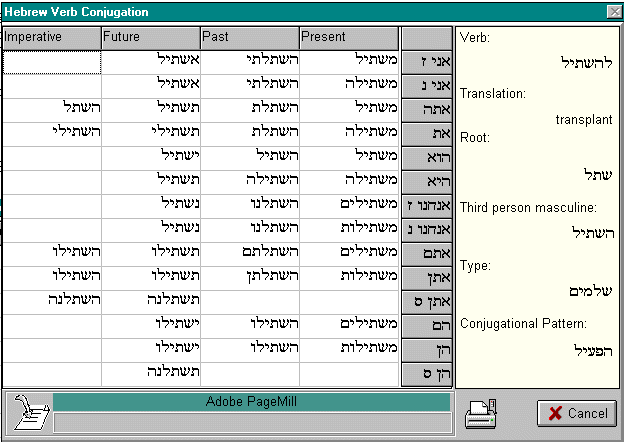Jerusalem Dictionary
(aka Milon Plus)
About the Program:
Better
than just a dictionary, Jerusalem Dictionary not only translates more than a
hundred thousand words from Hebrew
to English and English
to Hebrew, it is also a thesaurus with
synonyms and antonyms. And, it is a wonderful way to learn verbs, with
over 8000 fully conjugated Hebrew and English verb tables, and thousands of English and Hebrew
expressions.
In addition, with Jerusalem Dictionary you can paste Hebrew words and phrases into any Hebrew supporting word processor.
It is a SPELL-CHECKER, TRANSLATOR AND BILINGUAL VERB CONJUGATOR ALL IN ONE:
From the main screen, the power of the product is readily apparent. You can
spell-check and translate a word, browse the dictionary, cross-check a
translation, view synonyms, antonyms, tense and more. As a standalone program,
simply type in a word and its translations appear. The word can be typed in
English and have the translation in Hebrew or vice versa. When run in background
mode, you highlight a word in your word processor, press the hotkey and the
Jerusalem Dictionary window appears with the word already entered into the input
box.
When a word is misspelled, a list of close words is presented from which to
choose the correctly spelled word. The program will let you know if the word is
a noun, adjective, pronoun, etc. or possibly several of them at once. A list of
same-language antonyms (opposites) appears, making this program worthwhile even
if you don't require the Hebrew.
Languages and use of expressions can be a curious thing. An expression used in
English cannot be literally translated word for word into another language and
mean the same thing. Jerusalem Dictionary includes a list of thousands of
bilingual expressions.
Besides antonyms and translations, Jerusalem Dictionary provides a list of
synonyms in the language of your choice. Click on any of the synonyms the
translation and antonym appear automatically.
It is possible to add to Jerusalem Dictionary's already extensive dictionary.
Jerusalem Dictionary conjugates verbs using over 8,000 tables of fully
conjugated Hebrew and English verbs. The full list of Hebrew verbs can be
displayed and scrolled.
This is a product you’ll be glad you have around.
System
requirements:
Requires an IBM computer or compatible; Pentium processor or
equivalent; 16 MB RAM; 10 MB of
available hard disk space; a CD drive; Microsoft Windows 95, 98, ME, NT, 2000, or
XP.
Screen Shots:
Below is an example of Jerusalem Dictionary being used for English to Hebrew translation. We typed in the word infinity and pressed the translate button on the top of the column of buttons to the left (open book button). Immediately we see translations in Hebrew and antonyms of infinity. We could then select "en-sof", the lower translation and press the cross-check button (check mark button) to reverse the process and check the nuance of meaning for "en-sof". Cross check puts the Hebrew word in the place where infinity is now at, and then translates "en-sof", showing possible English meanings of the word. This capability will greatly increase the ability of people new to Hebrew, to use the best word.
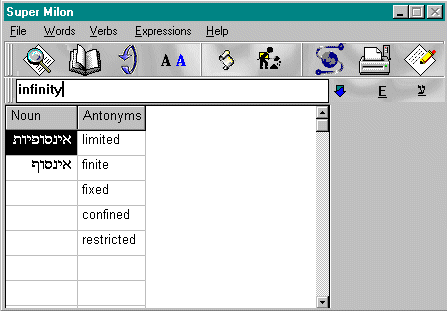
Below, we've typed in a Hebrew verb to show you translation from Hebrew to English. Jerusalem Dictionary shows that it is a verb, with the exact meaning "counsel".
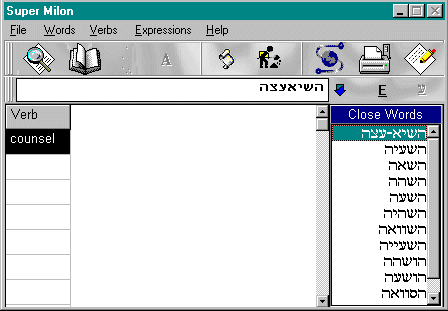
In translating the word "code", Jerusalem Dictionary recognizes that code can be used in English as either a noun or a verb. It then translates the word showing the correct Hebrew words to use as a noun or a verb.
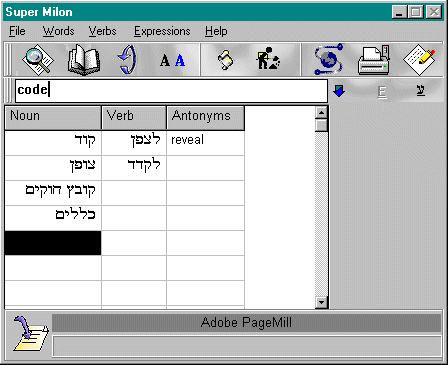
The example below shows the capability to browse the dictionary. In this case, we are browsing the English dictionary, but you can browse the Hebrew dictionary in just the same way.
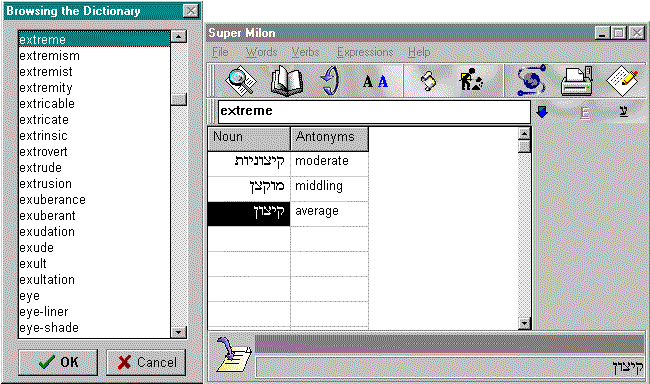
The fully conjugated Hebrew verb table below will teach you how Hebrew is used in everyday speech. In this instance, we have the verb table for the English verb "transplant". The columns show the imperative, future, past, and present forms of the verb in Hebrew; and the gray vertical column indicates particular usage in a sentence. The particular usage is just like the English (he, she, they, I, etc.) parts of a sentence that modify the verb. For example, in English we have the verb "deliver". Different forms of the verb are: deliver, delivers, delivered, will deliver, has delivered, is delivering. The fully conjugated Hebrew verb table shows the exact usage and correct spelling for verbs. It's like having a professor of Hebrew there to tell you which is the correct verb to use and the correct spelling.
